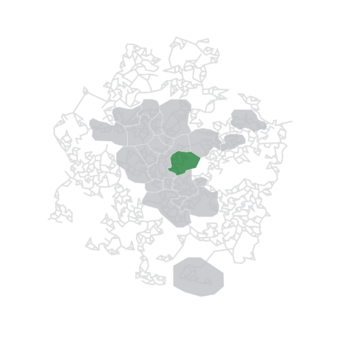Carasi Pact
This article is incomplete because it is pending further input from participants, or it is a work-in-progress by one author. Please comment on this article's talk page to share your input, comments and questions. Note: To contribute to this article, you may need to seek help from the author(s) of this page. |
Carasi Pact Carasi Caenth | |
|---|---|
 | |
| Capital | Atrenas |
| Official languages | Carasi |
| Ethnic groups | Caras |
| Demonym(s) | Carasi Pact |
| Government | Ecclesio-Stratocratic Oligarchy |
• Primarchousa | Araedis |
| Legislature | Elder council |
| History | |
| Population | |
• 2500 estimate | 90,000,000,000 |
| GDP (nominal) | estimate |
• Total | wip |
| Currency | ?? (?) |
| Driving side | right |
The Carasi Pact (Carasi: Carasi Caenth), sometimes shortened to just The Pact, is a confederation, alliance, or conglomeration of several worlds near the Galactic Center. The population is overwhelmingly Carasi, an enatic tribal people descended from indigenous refugees deported from Dhal'dhyû following that planet's unification by Niltháre the Good. This deportation, the culmination of centuries or millennia of abuse, holds a place in Carasi cultural memory where it plays the role of a national myth. The Carasi, with a population of near 90,000,000,000 across 13 systems, have evolved and mutated due to long-term exposure to Arae crystals, planetary habitation, environmental realities, and isolation, and now significantly differ from the Drudari in both physical appearance and psionic universalism.
The Caras had been isolated for centuries by the time they were rediscovered by the Drudari Ecumene. The only confirmed wind connections outside of Carasi space connect it to the Drudari frontier and Ravnikai space; the distance from other space-faring civilizations, the limited means of entry into Carasi space, the closeness to the Galactic Center, and the use of generation ships instead of winds in the initial deportations and, thus, the lack of any known routes to their new homeworld all contributed towards the isolation experienced by the Caras.
Once resettled on a new homeworld, modern Atrenas, the Caras quickly discovered henges made of Arae crystals. These henges produced a strong psionic signal that connected them to others through the winds, and ultimately to Araesala'a, presumed to be the planetary origin of the crystals. It is believed that this led to the Caras being one of the first races to utilize the winds, but failing to expand beyond the short range revealed by the henges. Over time, more Arae crystals were discovered, their natural properties explored, and in turn their use as a basic tool became ubiquitous. Long-term exposure to these psionically-resonant crystals is believed to be the cause of the universal rate of psionic ability among the Caras, as well as potentially for the changes in pigmentation when compared to the Drudari.
The Carasi government works on what has been termed the Big Man system, an ironic name considering the Enatic nature of Carasi society. Groups of people are primarily led by persons of particular influence, notably those who make the best warriors or have the most resources at their disposal - though these are not necessarily distinct from one another. These "Big Men" then dedicate themselves to a higher Big Man, creating an informal hierarchy that climbs until the Primarch(ousa) at the top. These Big Men are only as influential as their ability to maintain a following, and so many also turn to the more stable priestly institutions of Carasi society. Together, the Big Men and priesthood reinforce one another on the individual level and create cohesive social organization.
Apart from political leaders, the intangible power of oaths and personal honor also help to guide society. The Pact is one such example of an oath, sworn by the highest Big Men and ritually maintained with the natural passing of power from individual to individual. It is viewed by some observers as more of an abstract phenomenon than a proper country, built upon the concept of loyalty to one another above all else - that "Carasiness" should be held as the dominant determining factor of any given situation. Others state that this is the same behavior that most countries undertake, and others still mention that the active oaths taken ritually express a cohesive idea of unity, fealty, alliance, and togetherness indicative of a proper country rather than an informal bond. Complex views on the nature of the Caras have greatly influenced discussion by outsiders in this debate.